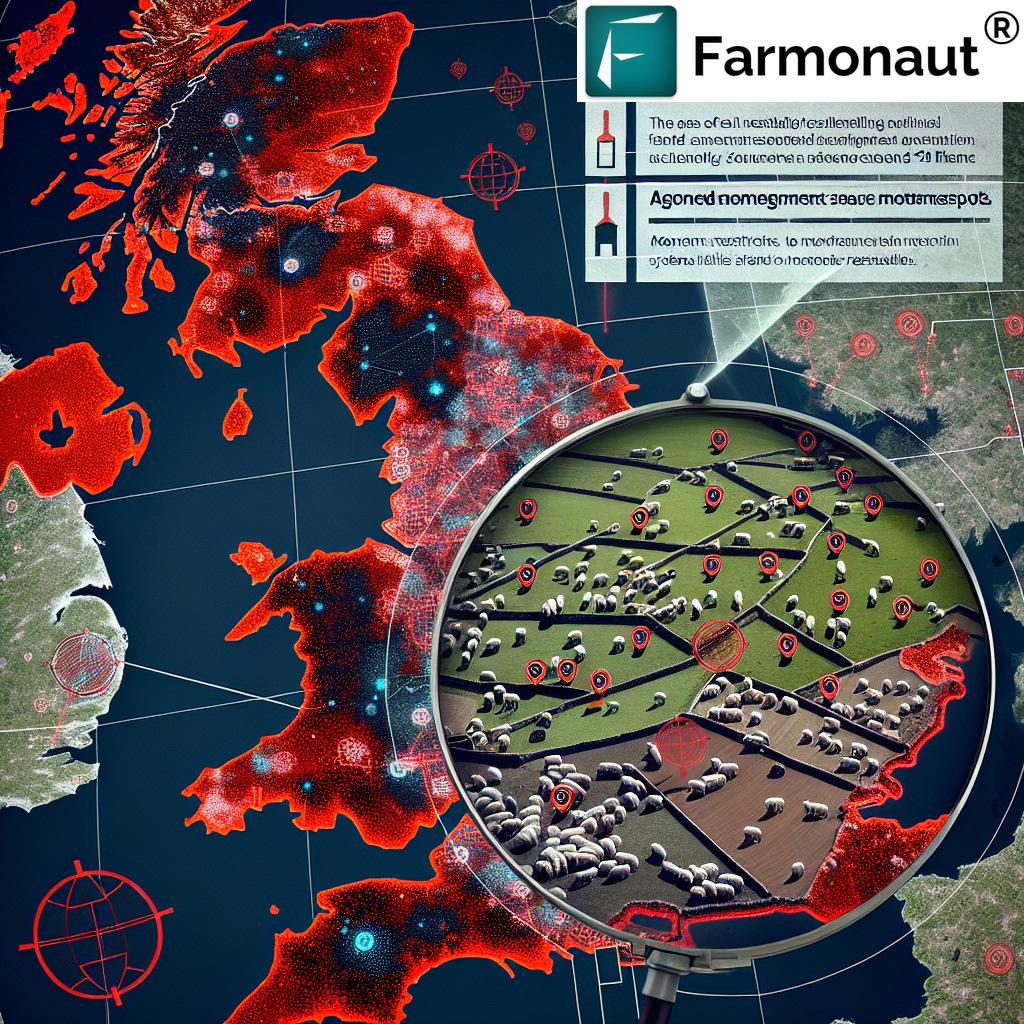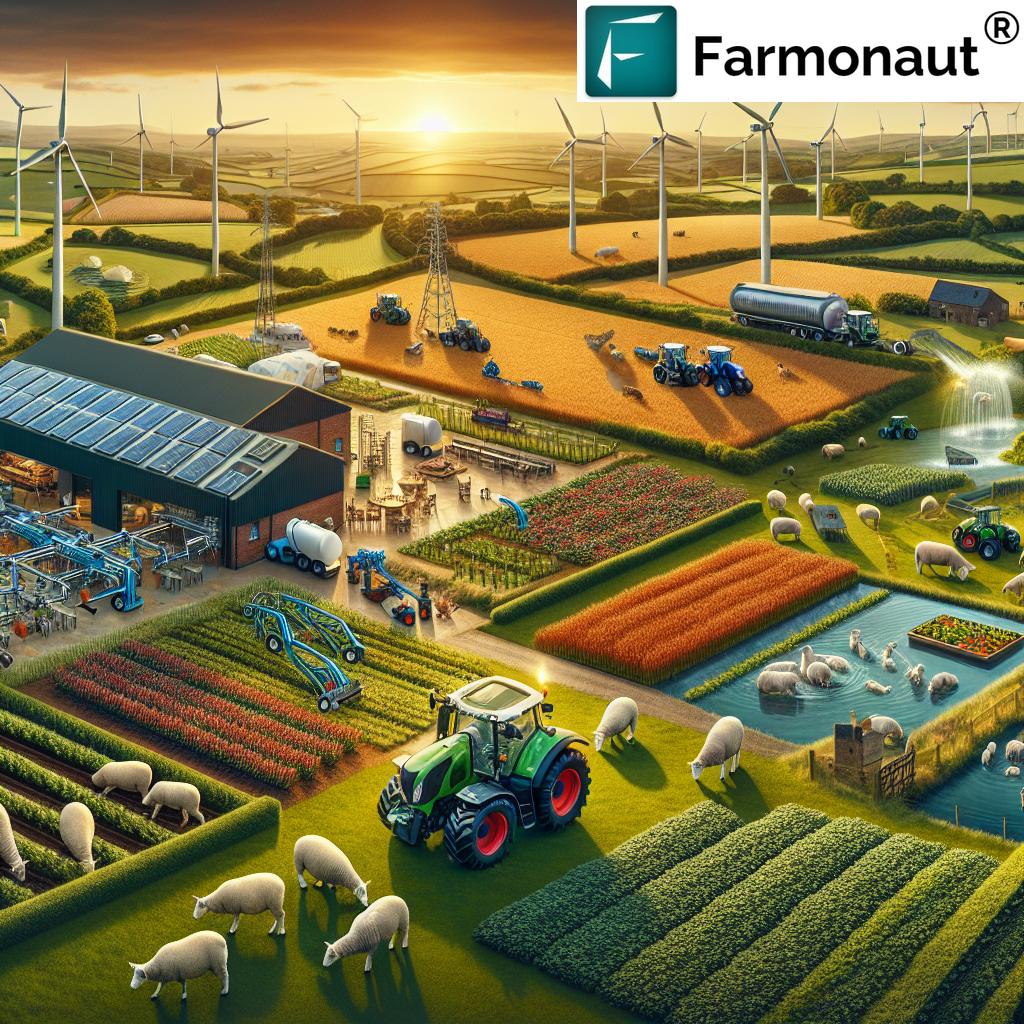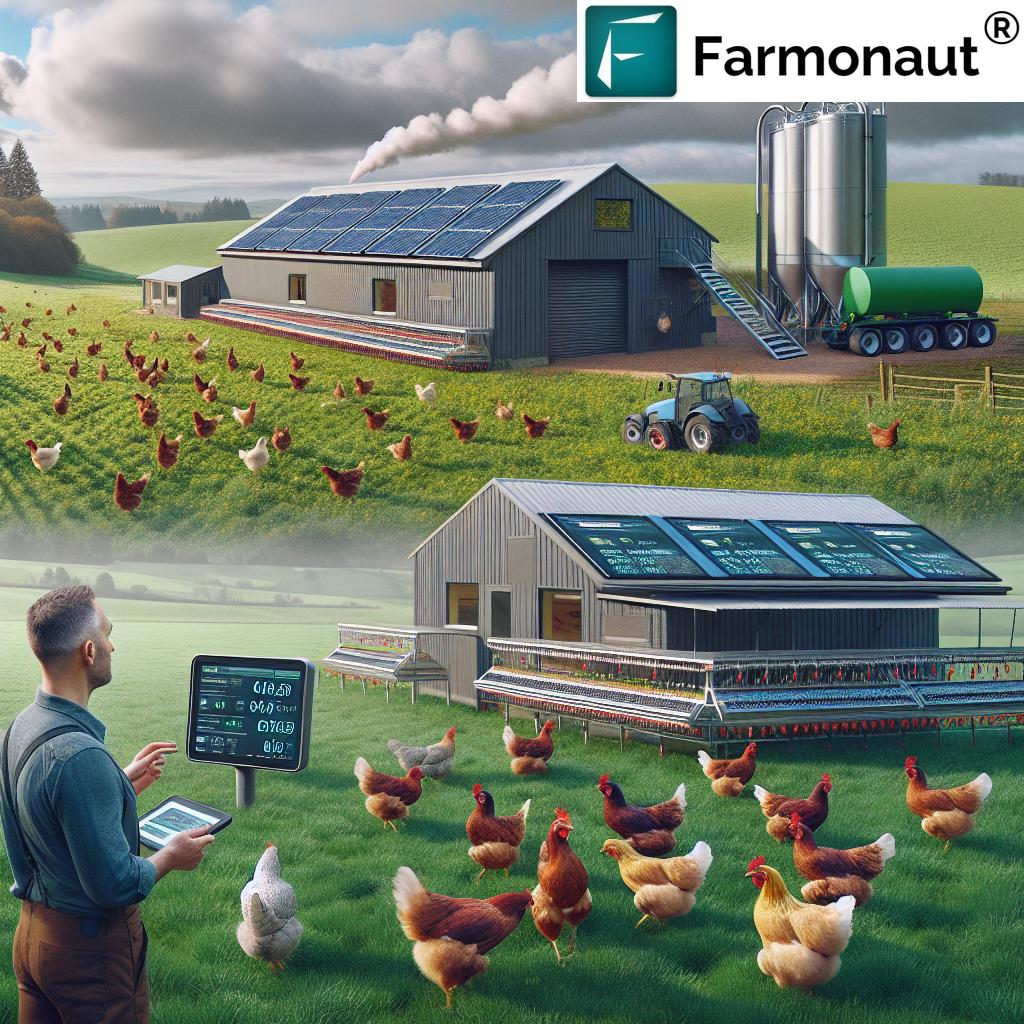Brexit’s Impact on UK Farming: How Farmonaut’s Smart Agriculture Solutions Can Mitigate Risks
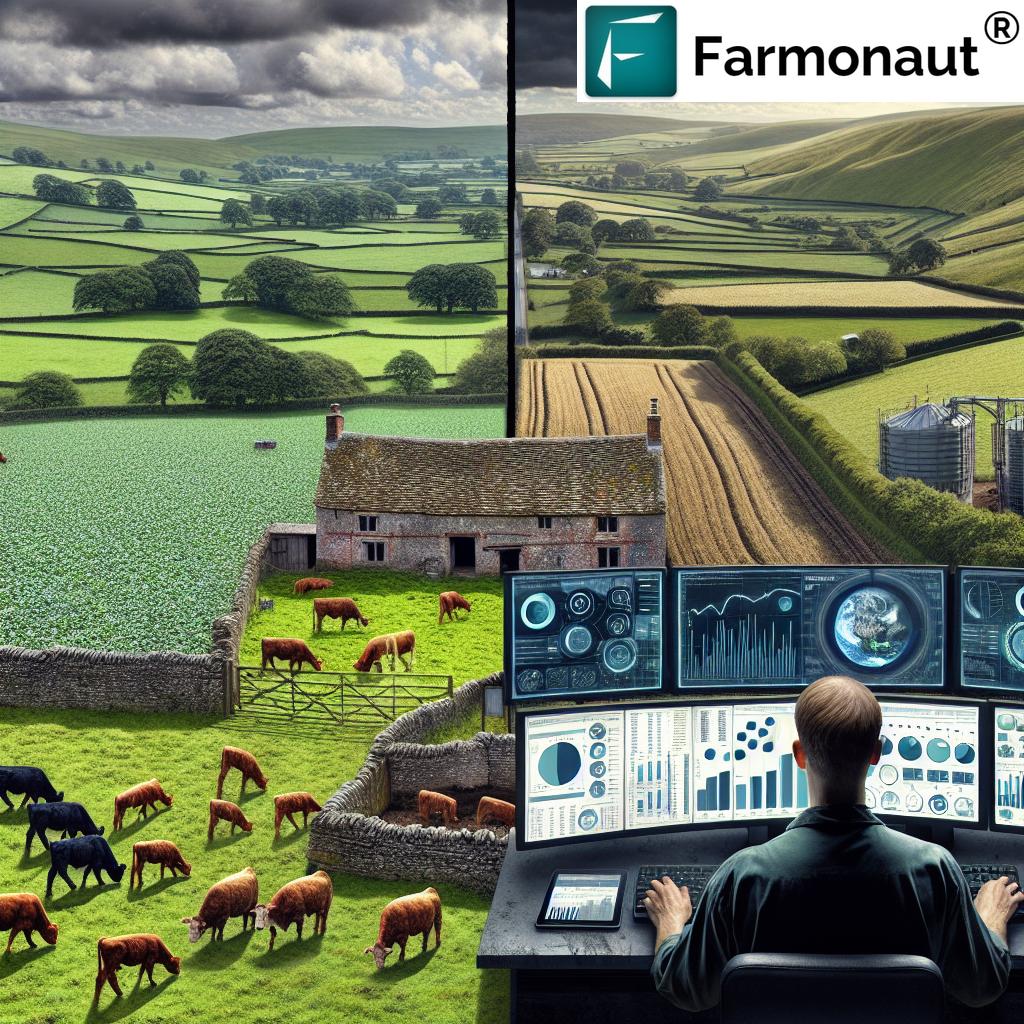
“Brexit could affect up to 475,000 agricultural workers in the UK, potentially reshaping the farming labor market.”
As we navigate the complex landscape of post-Brexit Britain, the agricultural sector finds itself at a critical juncture. The impact of Brexit on UK farming is profound and far-reaching, presenting both challenges and opportunities for farmers across England, Scotland, and Wales. In this comprehensive analysis, we’ll explore how Brexit is reshaping the agricultural landscape and how innovative solutions, particularly those offered by Farmonaut, can help mitigate the risks and capitalize on new opportunities.
The Changing Face of UK Agriculture Post-Brexit
Brexit has ushered in a new era for UK agriculture, with significant changes to policies, trade relationships, and labor markets. These shifts are affecting every aspect of farming, from small family-run enterprises to large commercial operations. Let’s delve into the key areas of impact:
- Agricultural Policies: The departure from the EU’s Common Agricultural Policy (CAP) means the UK is developing its own agricultural support system. This transition brings uncertainty but also the potential for more tailored support for UK farmers.
- Trade Relationships: New trade agreements are reshaping import and export dynamics, affecting market access and competition for UK farm products.
- Labor Market: Changes in immigration policies are impacting the availability of seasonal workers, a crucial component of the UK farming workforce.
- Environmental Standards: The UK has the opportunity to set its own environmental and animal welfare standards, which could influence farming practices and market positioning.
These changes are creating a complex environment for farmers, requiring adaptation and innovation to thrive in the post-Brexit landscape.
Challenges Facing UK Farmers in the Wake of Brexit
The aftermath of Brexit presents several significant challenges for UK farmers:
- Market Access: New trade barriers with the EU, the UK’s largest agricultural export market, are affecting sales and profitability.
- Subsidy Changes: The transition from EU subsidies to a new UK system is creating uncertainty around financial support.
- Labor Shortages: Restrictions on EU workers are exacerbating existing labor shortages in the agricultural sector.
- Regulatory Changes: Adapting to new UK-specific regulations and standards requires time and investment.
- Price Volatility: Currency fluctuations and changing trade dynamics are leading to increased price volatility for both inputs and outputs.
These challenges are forcing farmers to reassess their business models and seek innovative solutions to maintain profitability and sustainability.
Opportunities in the Post-Brexit Agricultural Landscape
While challenges abound, Brexit also presents opportunities for UK agriculture:
- Tailored Support: The UK has the chance to develop agricultural policies that better suit its specific needs and priorities.
- New Markets: Brexit opens the door to new trade agreements, potentially providing access to new export markets.
- Innovation Incentives: The need to compete globally is driving investment in agricultural technology and innovation.
- Sustainability Focus: There’s an opportunity to position UK agriculture as a leader in sustainable and high-quality food production.
To capitalize on these opportunities, UK farmers need to embrace innovation and adopt smart farming practices.
The Role of Smart Agriculture in Mitigating Brexit Risks
“Farmonaut’s smart agriculture solutions can help increase farm productivity by up to 20% in post-Brexit UK.”
In the face of Brexit-related challenges, smart agriculture solutions are emerging as powerful tools for UK farmers. These technologies can help optimize resource use, improve productivity, and enhance decision-making. Here’s how smart agriculture can address specific Brexit-related issues:
- Precision Agriculture: By using data-driven insights, farmers can optimize inputs and maximize yields, helping to offset potential losses from reduced subsidies or market access.
- Farm Management Software: Digital tools can streamline operations and improve efficiency, crucial for maintaining competitiveness in a changing market landscape.
- Crop Monitoring Systems: Advanced monitoring helps farmers respond quickly to changing weather patterns and market demands, enhancing resilience.
- Supply Chain Optimization: Technology can help farmers adapt to new trade relationships by improving traceability and market responsiveness.
At the forefront of these smart agriculture solutions is Farmonaut, offering a comprehensive suite of tools designed to help UK farmers navigate the post-Brexit landscape.
Farmonaut: Empowering UK Farmers in the Post-Brexit Era
Farmonaut’s innovative platform provides a range of solutions tailored to address the challenges faced by UK farmers in the wake of Brexit. Let’s explore how Farmonaut’s technologies can make a difference:
1. Satellite-Based Crop Health Monitoring
Farmonaut’s satellite imagery technology offers real-time insights into crop health, helping farmers make informed decisions about irrigation, fertilizer use, and pest management. This precision approach can lead to significant improvements in yield and resource efficiency, crucial for maintaining profitability in a potentially more competitive post-Brexit market.
2. Jeevn AI Advisory System
The AI-driven Jeevn advisory system provides personalized recommendations based on farm-specific data and market trends. This tool can be invaluable for UK farmers adapting to new agricultural policies and market conditions post-Brexit, offering guidance on crop selection, resource allocation, and market positioning.
3. Blockchain-Based Product Traceability
With potential changes in trade regulations and increased focus on product origin, Farmonaut’s blockchain traceability solution can help UK farmers meet new compliance requirements and differentiate their products in both domestic and international markets.
Explore Farmonaut’s API Solutions
4. Fleet and Resource Management
Efficient resource management is crucial in the face of potential input price volatility and labor shortages. Farmonaut’s fleet and resource management tools can help farmers optimize their operations, reducing costs and improving productivity.
5. Carbon Footprinting
As the UK develops its own environmental policies, farmers may face new sustainability requirements. Farmonaut’s carbon footprinting feature allows farmers to monitor and reduce their environmental impact, potentially opening up new market opportunities and ensuring compliance with evolving regulations.
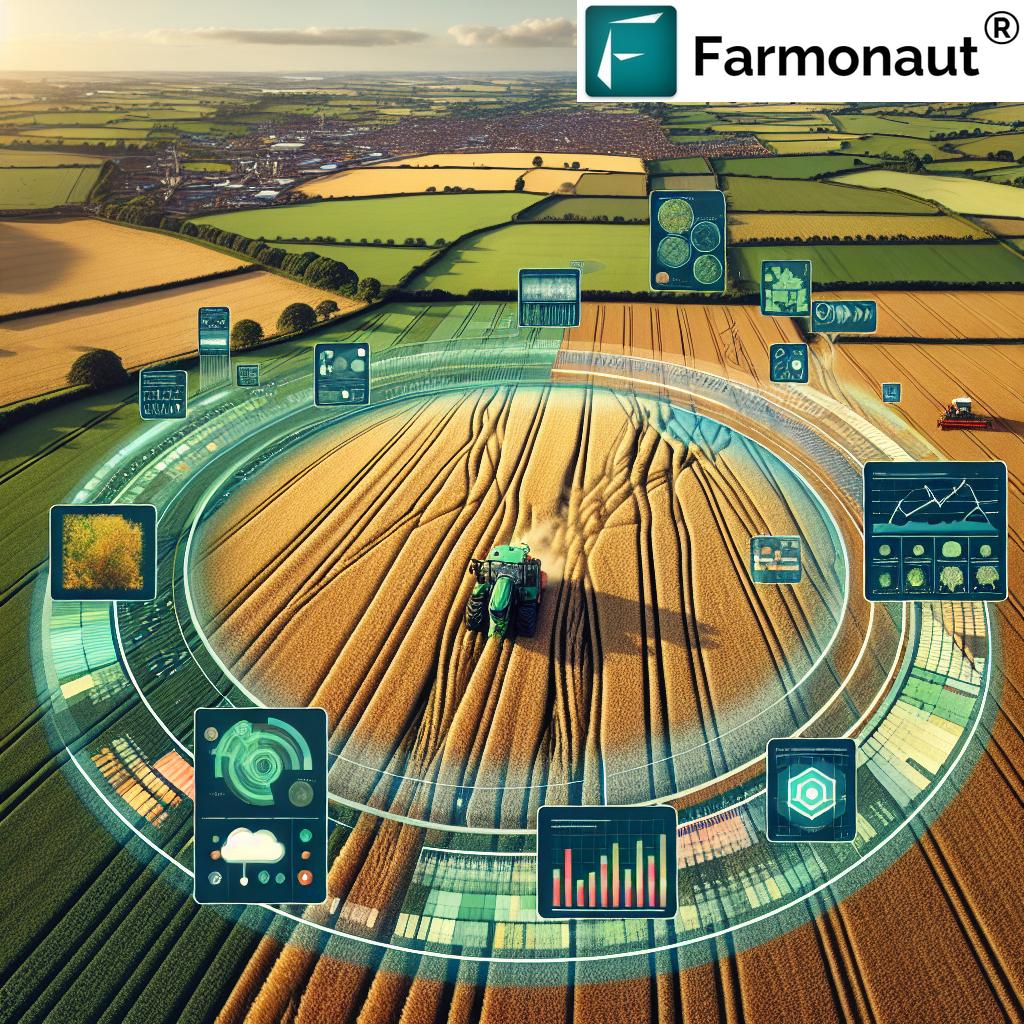
Implementing Farmonaut Solutions: A Practical Guide for UK Farmers
Integrating Farmonaut’s smart agriculture solutions into your farming operations can seem daunting, but the process is designed to be user-friendly and adaptable to farms of all sizes. Here’s a step-by-step guide to getting started:
- Assessment: Begin by evaluating your farm’s specific needs and challenges in light of Brexit impacts.
- Platform Selection: Choose the Farmonaut tools most relevant to your operation. You can start with basic crop monitoring and expand to more advanced features as needed.
- Data Integration: Input your farm data into the Farmonaut system. This can include field boundaries, crop types, and historical yield data.
- Training: Familiarize yourself and your team with the Farmonaut platform. The company offers comprehensive tutorials and support.
- Implementation: Start using the tools in your daily operations, gradually integrating the insights into your decision-making process.
- Monitoring and Adjustment: Regularly review the impact of Farmonaut’s solutions on your farm’s performance and adjust your strategies accordingly.
Access Farmonaut’s API Developer Docs
Case Studies: UK Farms Thriving with Farmonaut Post-Brexit
While we can’t provide specific case studies, we can illustrate how different types of UK farms might benefit from Farmonaut’s solutions in the post-Brexit context:
Arable Farm in East Anglia
An arable farm facing challenges with reduced EU subsidies and volatile grain prices could use Farmonaut’s crop monitoring system to optimize fertilizer use and improve yield predictions. This could help the farm maintain profitability despite changing market conditions.
Dairy Farm in Somerset
A dairy farm struggling with labor shortages could implement Farmonaut’s fleet management and AI advisory systems to streamline operations and improve herd management. This could help offset the impact of reduced access to EU workers.
Mixed Livestock Farm in Scotland
A mixed livestock farm facing new export regulations could use Farmonaut’s blockchain traceability system to meet compliance requirements and potentially access new markets by demonstrating the provenance and quality of their products.
Apple Orchard in Kent
An apple grower concerned about changing weather patterns and pest pressures could use Farmonaut’s precision agriculture tools to monitor orchard health and optimize pest management strategies, ensuring consistent quality and yield.
The Future of UK Farming: Embracing Innovation in a Post-Brexit World
As the UK agricultural sector continues to adapt to the post-Brexit landscape, the role of smart farming technologies will only grow in importance. Farmonaut’s suite of solutions offers a pathway for UK farmers to not just survive but thrive in this new era. By embracing these innovative tools, farmers can:
- Improve resilience to market volatility and policy changes
- Enhance productivity and resource efficiency
- Meet evolving regulatory and sustainability requirements
- Access new markets and differentiate their products
- Adapt more quickly to changing environmental conditions
The future of UK farming lies in the intelligent application of technology, data-driven decision-making, and sustainable practices. Farmonaut is at the forefront of this agricultural revolution, providing the tools and insights needed to navigate the challenges and opportunities of the post-Brexit era.
Download Farmonaut’s Mobile Apps:
Brexit Impact on UK Farming Sectors and Farmonaut Solutions
| Farming Sector | Potential Brexit Impact | Risk Level | Farmonaut Smart Agriculture Solutions |
|---|---|---|---|
| Arable Farming | -15% change in trade, reduced subsidies | High | Precision Crop Monitoring, AI Advisory for Resource Optimization |
| Dairy Production | -10% labor availability, new export regulations | Medium | Fleet Management, Blockchain Traceability |
| Livestock Management | -20% change in trade, new welfare standards | High | Carbon Footprinting, AI-driven Market Insights |
| Horticulture | -30% seasonal labor shortage, market access changes | High | Satellite Crop Health Monitoring, Resource Management Tools |
Conclusion: Navigating the Future with Confidence
The impact of Brexit on UK farming is undeniable, presenting a complex mix of challenges and opportunities. However, with the right tools and strategies, UK farmers can not only weather this transition but emerge stronger and more competitive. Farmonaut’s smart agriculture solutions offer a comprehensive approach to addressing the key issues faced by farmers in this new era.
By leveraging satellite technology, AI-driven insights, and advanced data analytics, Farmonaut empowers farmers to make informed decisions, optimize their operations, and adapt to changing market conditions. Whether you’re managing an arable farm in England, a dairy operation in Wales, or a mixed enterprise in Scotland, Farmonaut’s platform can be tailored to meet your specific needs.
As we look to the future of UK agriculture, it’s clear that innovation and adaptability will be key to success. By embracing smart farming technologies like those offered by Farmonaut, UK farmers can position themselves at the forefront of a new, more resilient, and sustainable agricultural sector.
The journey ahead may be challenging, but with the right tools and a forward-thinking approach, UK agriculture can thrive in the post-Brexit landscape. Farmonaut stands ready to support farmers every step of the way, offering the technology and insights needed to navigate this new era with confidence.
Farmonaut Subscriptions
Frequently Asked Questions
Q: How can Farmonaut help UK farmers adapt to post-Brexit agricultural policies?
A: Farmonaut’s AI advisory system can help farmers navigate new policies by providing personalized recommendations based on the latest regulations and market trends. The platform’s data-driven insights can assist in optimizing farm operations to align with new subsidy structures and compliance requirements.
Q: Can Farmonaut’s solutions address labor shortages in UK agriculture?
A: While Farmonaut doesn’t directly provide labor, its fleet and resource management tools can help farmers optimize their existing workforce and operations. This can partially mitigate the impact of labor shortages by improving overall farm efficiency.
Q: How does Farmonaut’s blockchain traceability help with new trade regulations?
A: Farmonaut’s blockchain-based traceability system provides a transparent and verifiable record of a product’s journey from farm to consumer. This can help UK farmers meet new export requirements, demonstrate compliance with standards, and potentially access new markets by providing assured product provenance.
Q: Is Farmonaut suitable for small family-run farms as well as large commercial operations?
A: Yes, Farmonaut’s platform is scalable and can be tailored to farms of all sizes. The company offers different packages to suit various needs and budgets, making smart agriculture solutions accessible to both small family farms and large commercial enterprises.
Q: How can Farmonaut’s carbon footprinting feature benefit UK farmers?
A: The carbon footprinting tool allows farmers to monitor and reduce their environmental impact. This can help in complying with new sustainability regulations, accessing green subsidies, and potentially commanding premium prices for environmentally friendly products in both domestic and international markets.
We hope this comprehensive guide has provided valuable insights into how UK farmers can leverage Farmonaut’s smart agriculture solutions to navigate the challenges and opportunities presented by Brexit. By embracing these innovative technologies, the UK agricultural sector can build a more resilient, efficient, and sustainable future.









